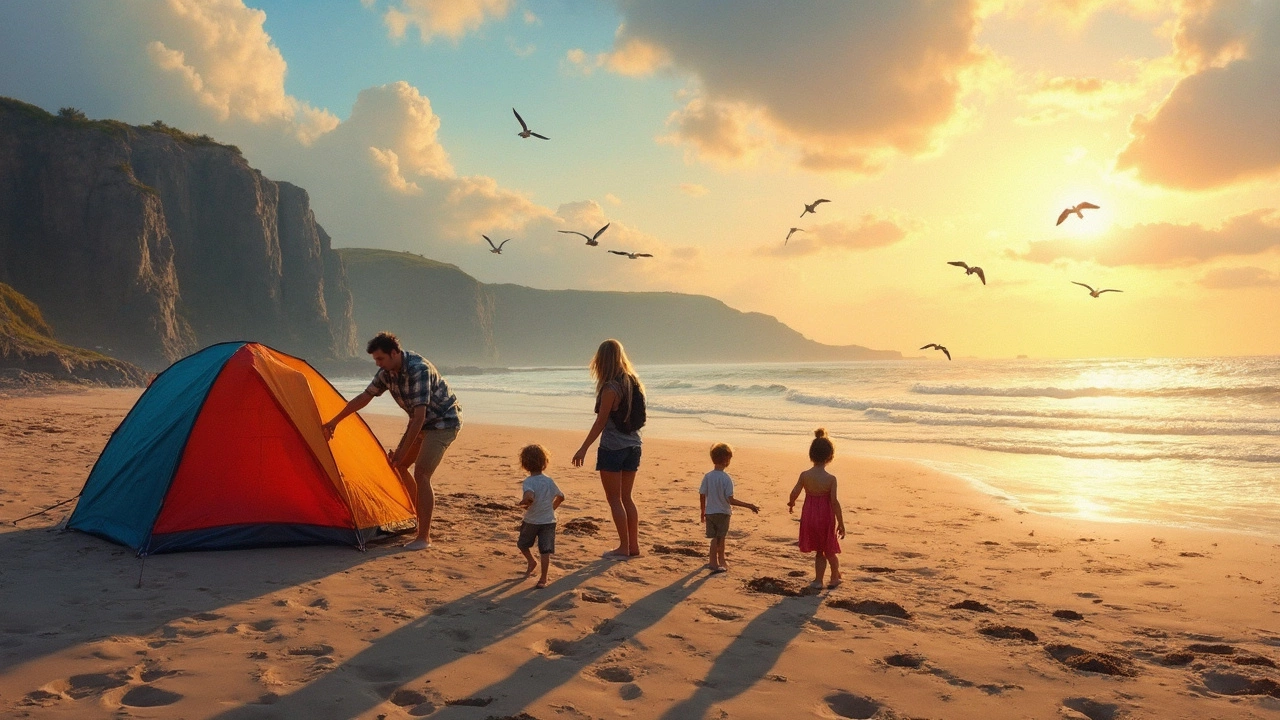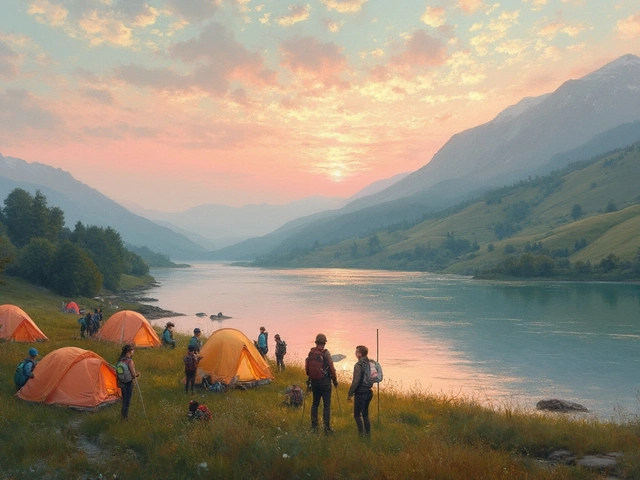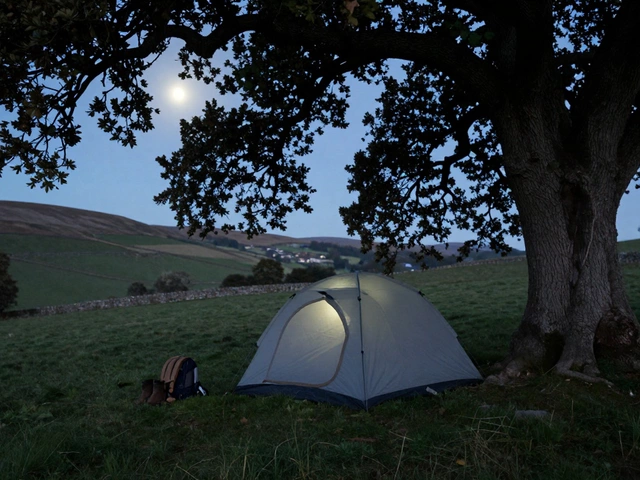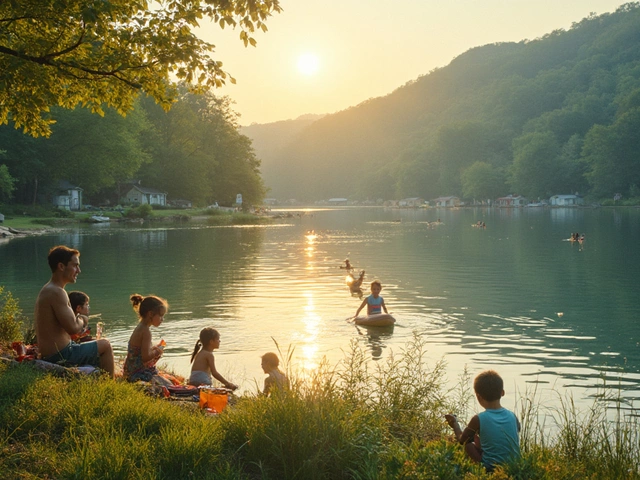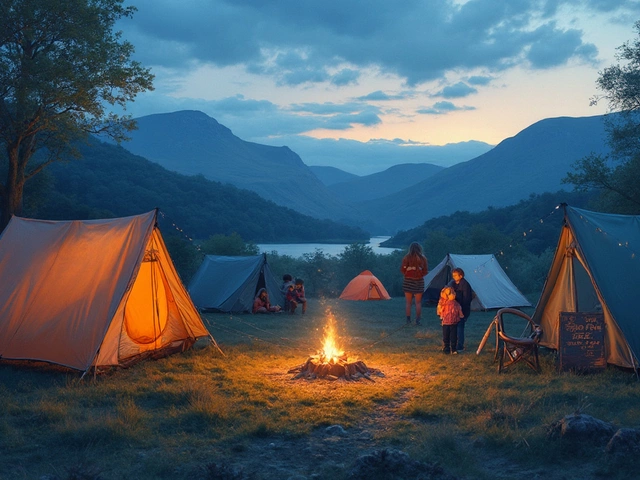Camping on beaches sounds like an incredible adventure, right? Imagine waking up to the sound of waves. But hold on, before you grab your tent, you need to know if it's legal to camp there.
In the UK, things aren't so straightforward. Beach access laws differ across Scotland, England, Wales, and Northern Ireland. While Scotland is known for its more relaxed wild camping laws, England and Wales have stricter rules. Generally, you can't just pitch a tent on a public beach without getting some form of permission.
- Legalities of Beach Camping in the UK
- Popular Beach Camping Spots
- How to Camp Responsibly
- Alternatives to Wild Beach Camping
- Tips for a Memorable Beach Camping Experience
Legalities of Beach Camping in the UK
Alright, so you're thinking of camping on a UK beach. Sounds epic, but here's where it gets a bit tricky. In the UK, the rules can be a bit of a maze. It's crucial to know what you're allowed to do before you set up camp. Let's break it down by region:
Scotland: Lucky for you, Scotland's got something called the "Right to Roam." This basically means you can camp almost anywhere as long as you're respectful. Beaches generally fall under this freedom, so you've got more flexibility here. Just remember to keep it tidy.
England and Wales: Unfortunately, it's not as chill here. Wild camping on beaches is a no-go without the landowner’s permission. The coastal areas are usually privately owned or managed by local councils. It's always best to ask for permission directly to avoid any awkward encounters with authorities.
Northern Ireland: In Northern Ireland, like in England and Wales, beach camping without permission can get you in trouble. It's best to look for designated campsites or get explicit consent if you’re dreaming of that beachside tent view.
If you're caught wild camping illegally in England, Wales, or Northern Ireland, you might be asked to leave or even face fines. It sounds harsh, but these rules are there to protect the stunning coastline and ensure it's safe and enjoyable for everyone.
- Understand the specific rules of the region you're in.
- Always seek permission if you're unsure.
- Consider using official campsites that offer easy beach access.
In summary, while the idea of UK beach camping is appealing, it’s crucial to know and follow the rules to keep your adventure fun and drama-free. Always leave the place as you found it, if not cleaner, and be considerate of local wildlife and fellow beachgoers.
Here’s a quick glance to compare the rules in various UK regions:
| Region | Camping Rule |
|---|---|
| Scotland | Permitted under "Right to Roam" with respect |
| England and Wales | Not permitted without permission |
| Northern Ireland | Not permitted without permission |
Popular Beach Camping Spots
Alright, so now you're caught up on the legal side of things, where can you actually set up camp? The UK is bursting with stunning beaches, and some are more welcoming to campers than others.
First up, let's talk about Scotland. The western coast, particularly the Isle of Skye and the Outer Hebrides, offer jaw-dropping beaches that embrace wild camping. Generally, you can camp freely here, but remember, be respectful and follow the Scottish Outdoor Access Code.
Heading south to England, places like Shell Island in Wales are a hit with beach campers. It's technically not in England, but it's close enough and offers a designated campsite right near the sand. Another spot that's gained popularity is Pembrey Country Park in Wales, providing a mix of facilities and natural beauty.
In Cornwall, Whitsand Bay allows beach camping through a nearby campsite that provides direct beach access. But be sure to secure a spot early since it's a favorite summer destination.
For those adventurous souls looking for something off the beaten path, the beaches around the Dorset Jurassic Coast are exquisite. However, you’ll need to aim for organized campsites here.
Keep in mind that in England, it's often easier finding beach campsites close to the shore rather than on the beach itself due to stricter rules. Here's a quick recap:
- Isle of Skye and Outer Hebrides - Embrace wild camping with open arms.
- Shell Island, Wales - Offers designated beach camping areas.
- Pembrey Country Park, Wales - Perfect mix of beach access and facilities.
- Whitsand Bay, Cornwall - Book early to enjoy sandy shores.
- Dorset Jurassic Coast - Ideal for campsite-friendly beach access.
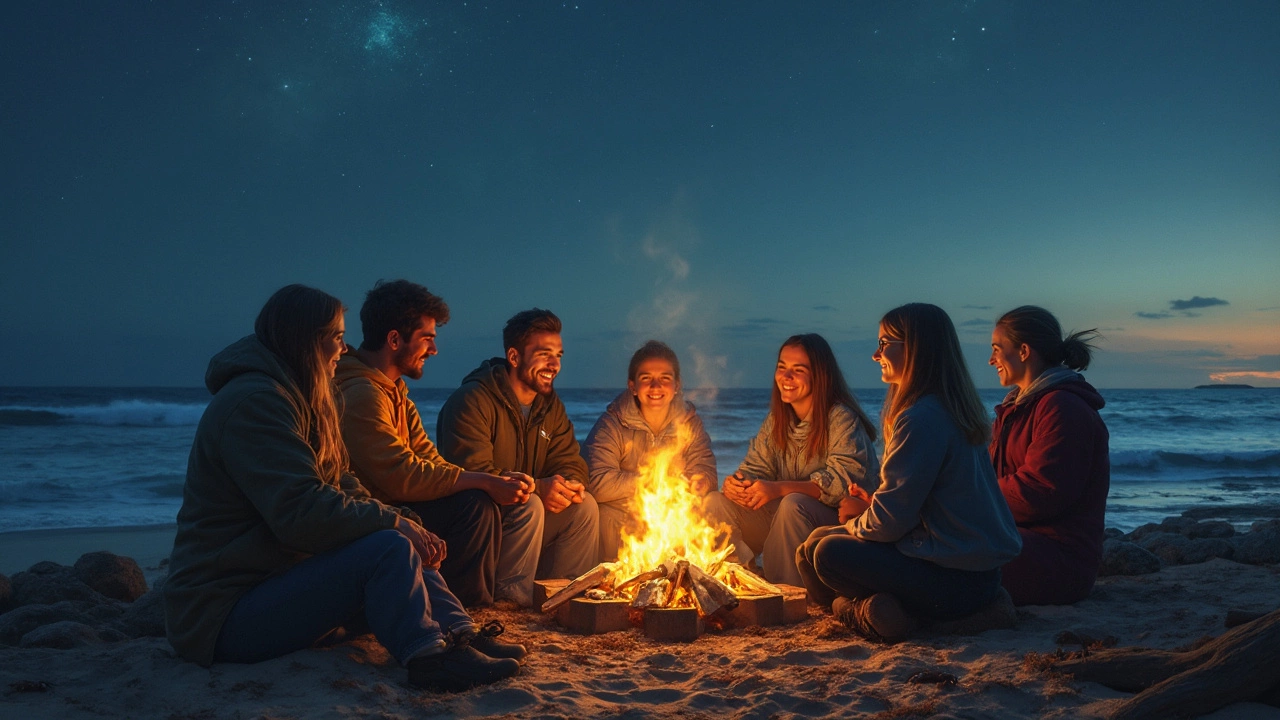
How to Camp Responsibly
Alright, so you’ve found a beach where it’s okay to set up camp. But it’s not just about putting up your tent and chilling by the sea. Responsible camping is key to keeping our beaches beautiful and ensuring that we can continue enjoying them for years to come.
First up, always take your trash with you. Sounds simple, right? Yet it’s crucial. Nothing spoils a beach like leftover rubbish. Leave no trace should be every camper's motto—pack it in, pack it out. This means everything from food wrappers to tent pegs.
Next, consider where you’re setting up camp. Avoid spots too close to the water as tides can rise unexpectedly. More importantly, stay clear of sensitive wildlife areas like dunes or bird nests. There's a rhythm to these ecosystems, and our presence should disrupt it as little as possible.
When it comes to lighting a fire, check for any local regulations. Many beaches have rules against open fires due to environmental risks and safety concerns. If fires are allowed, keep them small and controlled, using driftwood that’s been freely available.
Here's a quick checklist to camp like a pro:
- Double-check local regulations for beach camping to avoid fines.
- Use biodegradable soap and toiletries to prevent harming local wildlife.
- Minimize noise pollution; both humans and wildlife appreciate peace.
- Be respectful of other campers and beach-goers. Keep your site tidy and your gear organized.
Following these tips not only helps the environment but also ensures that others can enjoy beach camping in the UK too. Plus, it’s always more enjoyable to camp in a pristine location than one that’s been trashed, right?
Alternatives to Wild Beach Camping
Okay, so you’ve understood that pitching a tent on any stretch of sand isn't as free as the wind. But don't worry, there are plenty of legal ways to enjoy a night by the sea without getting into trouble. Welcome to the world of UK beach camping alternatives!
First, consider camping in designated campsites near the coast. Many campsites provide easy beach access without the legal headaches. Some sites even offer amenities like showers, toilets, and camp shops – luxury you don't find while wild camping. A popular choice is the Treheli Farm in Wales, located right by the sea with stunning views of Cardigan Bay.
Another option that's been gaining popularity is beachside glamping. This isn't your typical camping; think comfy beds, proper bathrooms, and maybe even a seaside breakfast service. It’s the perfect option if you're looking for comfort while staying close to nature.
If you're set on that remote beach feel, why not try a coastal path? The UK has some amazing national trails, like the South West Coast Path in England, where you can find budget-friendly accommodations along the way.
| Option | Location | Amenities |
|---|---|---|
| Treheli Farm Camping | Wales | Showers, toilets, camp shop |
| South West Coast Path | England | Budget accommodations along the trail |
“It's better to explore designated areas for camping to ensure a safe and pleasant experience along the picturesque UK coastlines.” – British Camping Association
Finally, if it’s the sea air you crave, seaside B&Bs or small hotels can give you the sound of waves right outside your window without the fuss of setting up camp. Plus, you get a full English breakfast the next morning!
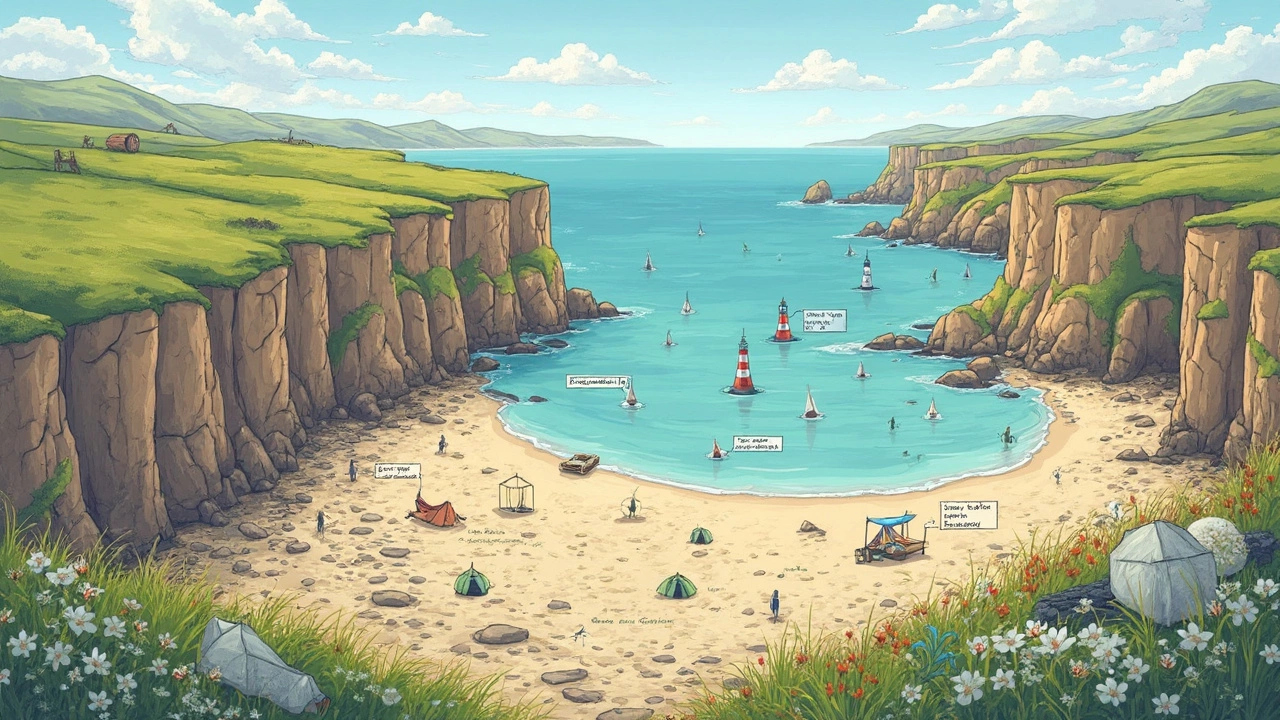
Tips for a Memorable Beach Camping Experience
Beach camping can be a blast if you know what you're doing. To make it unforgettable, plan ahead and follow some practical tips.
Firstly, always check the UK beach camping regulations before you go. Some beaches may require permits or have specific rules about camping.
Now, pack smart. You don’t want to haul a ton of gear across loose sand. Bring only what you need, focusing on essentials like a tent that can withstand the sea breeze, a warm sleeping bag for those chilly nights, and cooking equipment that’s easy to use.
- Scout for Flat Spots: When picking a camping spot, look for a flat area above the high tide line, so you won’t wake up in the sea!
- Weather Watch: Keep an eye on the weather. It might seem obvious, but coastal weather can be unpredictable, and knowing what to expect can save your trip.
- Respect Nature: Leave no trace. Take all your rubbish with you, and be mindful of local wildlife. Sand dunes might look like great spots, but they're often fragile ecosystems.
- Stay Safe: Avoid lighting open fires. It's not only about safety, but many beaches prohibit it to protect the environment.
- Local Goods: Support local businesses. Grab groceries or rent equipment nearby to support the area you're visiting.
If you're up for something different, consider joining in on organized beach cleaning events. It’s a great way to give back and enjoy the beach being spick and span the following morning.
And don't forget to have fun! There’s nothing like roasting marshmallows under a starry sky or exploring the rocky shorelines at low tide. If you follow these tips, your beach camping experience will be both memorable and responsible!
